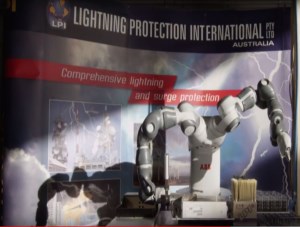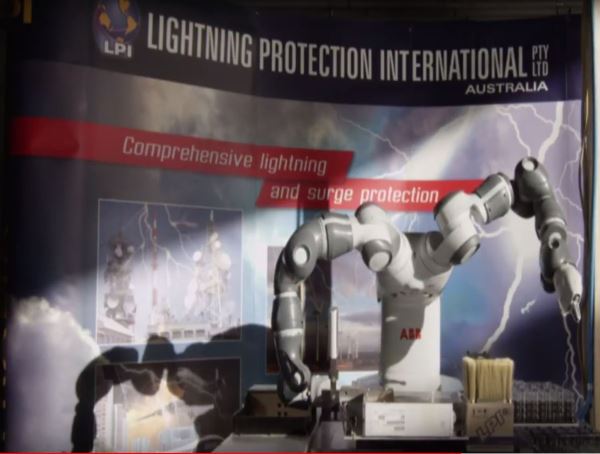Australian manufacturer Lightning Protection International (LPI) has been making lightning protection equipment in Tasmania since 2002.
The company makes a highly-customised range of direct-strike lightning protection products, along with grounding equipment and transient protection goods, for customers all over the world.
Due to an increased demand for their know-how, both in Australia and overseas, the company engaged ABB Robotics to supply them with a YuMi Collaborative Robot – a dual-arm, industrial robot that offers high scalability for short and variable production runs.
After only a few months, the ABB robot has not only reduced costs and production lead times, but has also maximised quality within LPI’s production facility in Hobart.
LPI’s customers are predominantly infrastructure-based, with many of these operating in the telecommunications and utilities sectors.
Due to the changing nature of telecommunications industries around the world, the team at LPI has its work cut out for it to ensure customer installations remain up-to-date, and safe from power surges – often with short lead times.
Improving reliability
“Recently in Australia we’ve been involved with upgrades to 4G networks for all carriers – the National Broadband Network (NBN) network has benefitted from a lot of our expertise,” said LPI CEO, Paul Hollingsworth.
“Similarly, in other countries, deployment of telecommunications and upgrades of telecommunications networks is one of our major customer segments. Others are utilities including power and water, as well as commercial construction.”
LPI’s products help these customers improve the reliability of their infrastructure. In the case of telecommunications clients, LPI ensures events such as lightning don’t cause damage or downtime to their installations.
“Across much of Australia we probably wouldn’t perceive that as a big issue, but in lots of our customer base in South East Asia and other parts of the equatorial belt, lightning events are the sorts of things that happen perhaps realistically every second day throughout the year,” said Hollingsworth.
“So if you have such high lightning incidents, damage or downtime becomes a very routine event.”
With LPI’s short and small production runs – and lots of variety from one product to the next – traditional robotic work cells were not ideally suited to the changing nature of the company’s manufacturing. They needed an equally-malleable robot.
The team began by researching ‘flexible robotics’, and came across the concept of collaborative robots. It wasn’t long before they happened upon ABB’s YuMi.
“YuMi was probably the best fit for what we required as a company. I hadn’t been to trade shows or seen YuMi in action at this stage, but from what we saw on the web, we decided pretty early on that it was the best fit for our needs,” said Hollingsworth.
“The fact that YuMi has two coordinated arms working together – so let’s say, simulating a human being – was a very attractive feature.
“And with options for integrated video, as well as vacuum and servo-grippers, YuMi gives us a lot of flexibility – not only of what we can manufacture, but of how we can handle and manipulate different parts, and how we can identify them.
“Essentially, YuMi gave us an entire box of tools in one robot – and that has ended up giving us quite a lot of flexibility for different tasks, as well.”
Service and support
LPI had previously used robotic work cells with traditional fencing, however according to Hollingsworth, this set-up reduced the flexibility of their robotics.
“The collaborative feature that has been helpful in this respect is the ability to work with human beings – with less interlocking, safety fencing, and so forth. YuMi as a collaborative robot has been an excellent fit in that respect,” Hollingsworth said.
Hollingsworth and the team at LPI have been “very impressed” with the service and support from ABB, since installing the YuMi robot.
“Geographically, Australia is a large place, with lots of distance between us – as a customer – and ABB. But regardless, I’ve found that when we have issues, we’ve been able to get those resolved fairly quickly, in our case through ABB in Melbourne. We’ve found their service and support very good,” said Hollingsworth.
YuMi has enabled the team to move from testing and configuring one product to a completely different product in only half an hour.
Increased productivity
“Of course, that’s required a little bit of thought and planning in terms of how we interface to YuMi with test jigs and so forth, but we’ve been able to show that we can swap from one type of product to another quite quickly,” said Hollingsworth.
“Changing from one task to another – for example, from testing to assembling a product – takes a little bit longer, but we’re still only talking a matter of hours, not days.”
In a matter of only months, using YuMi in test and inspection, and product assembly, the team at LPI has noticed a positive change in their production.
“In the first few months of using YuMi in real production, we’ve already increased productivity, while at the same time giving our people more interesting work and less repetitive tasks. And that’s really only with the first product release that we’ve pushed through YuMi,” said Hollingsworth. “We’re optimistic that productivity gains from fully deploying YuMi will lead to a payback of less than a year.”


